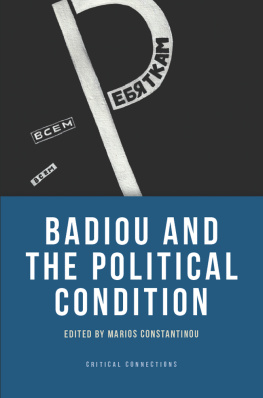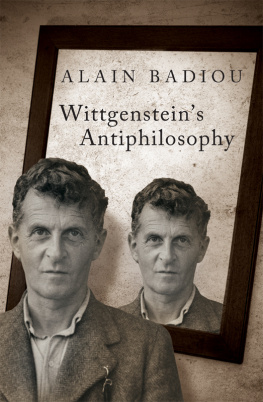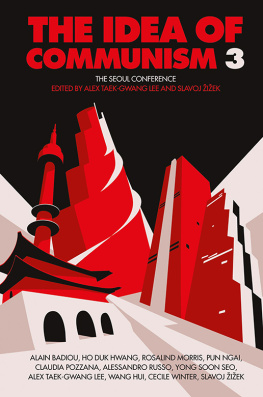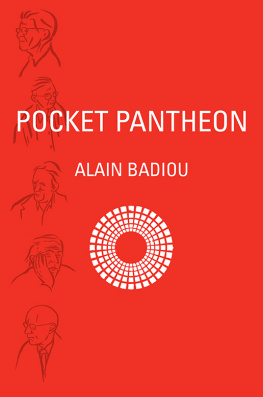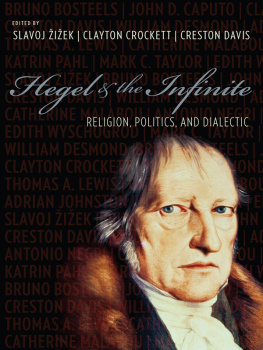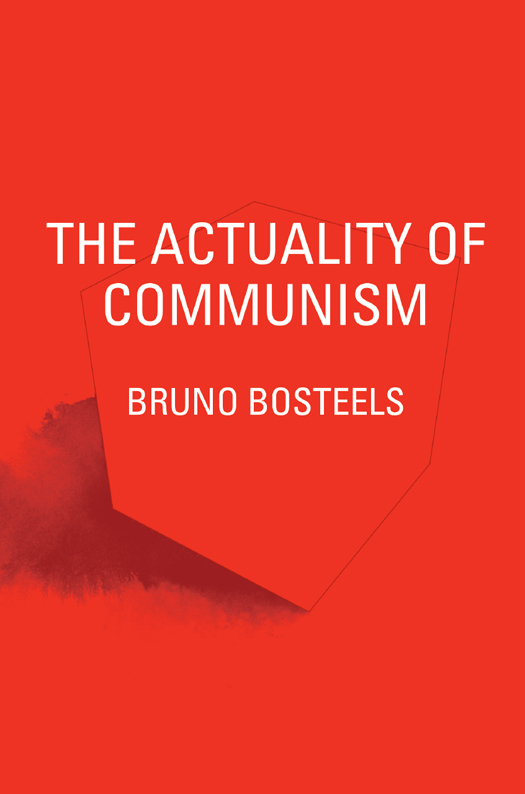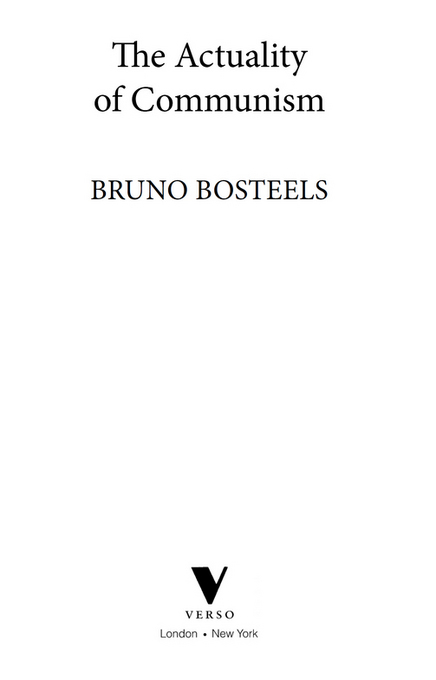Bruno Bosteels, Professor of Romance Studies at Cornell University, is the author of Badiou and Politics; Marx and Freud in Latin America; and The Actuality of Communism. He has translated several books by Alain Badiou into English and, until 2014, was the General Editor of diacritics.
This paperback edition first published by Verso 2014
First published by Verso 2011
Bruno Bosteels 2011, 2014
All rights reserved
The moral rights of the author have been asserted
Verso
UK: 6 Meard Street, London W1F 0EG
US: 20 Jay Street, Suite 1010, Brooklyn, NY 11201
www.versobooks.com
Verso is the imprint of New Left Books
ISBN-13: 978-1-78168-767-3
eISBN-13: 978-1-78168-768-0 (UK)
eISBN-13: 978-1-78168-769-7 (US)
British Library Cataloguing in Publication Data
A catalogue record for this book is available from the British Library
The Library of Congress Cataloging-in-Publication Data
A catalog record for this book is available from the Library of Congress
v3.1
Contents
Introduction
Communism is the solution of the riddle of history, and knows itself to be the solution.
Karl Marx, Economic and Philosophic Manuscripts of 1844
More than a solution to the problems we are facing today, communism is itself the name of a problem: a name for the difficult task of breaking out of the confines of the market-and-state framework, a task for which no quick formula is at hand.
Slavoj iek, First as Tragedy, Then as Farce
In the Name of Communism
Of What Is Communism the Name? Such was the guiding question behind a recent special dossier of ContreTemps, the French journal of communist critique co-founded by the late Daniel Bensad. Partly in response to the March 2009 London conference On the Idea of Communism, organized by Costas Douzinas and Slavoj iek, partly as a tongue-in-cheek allusion to Alain Badious bestseller The Meaning of Sarkozy, the original French title of which would translate only once, in Lisbon, but whose unparalleled internationalist vision and generosity serve as a constant reminder of what an intellectual can and should doI would want the following chapters to be read as ongoing attempts to answer his request and its guiding question.
My original response, like that of many other contributors not only to the special dossier of ContreTemps but also to the proceedings from the Paris conference partially published in a special issue of the journal Actuel Marx, consisted rather coyly in raising a new set of subsidiary questions.
Firstly, indeed, what is to be done with the past and with the burden of history? Can we formulate a form of communismas idea, as movement, as hypothesis, or as program; for the time being this dispute would not matter muchwithout automatically having to face up to the disastrous evidence stored in the official and unofficial archives? Or is the choice of one of these options, say in favor of
Confronted with so many lessons patiently taught and instantly forgotten, so many languishing memories and lukewarm commemorations, so many unabashed apostasies and shameful repentances, so many lost illusions and so much undigested nostalgia for the happy days of yesteryear, do we not need a strong dosage of active forgetfulness to combat the culture of memory?
Then again, do we not also cause actual emancipatory politics to perish when we simply ignore the long history of communism, or of communisms in the pluralof that communism which is not one, but multiple? As Vronique Bergen argues:
Furthermore, to try by some discretionary decree to amputate the name and idea of communism from the
A question, this last one, concerning the risk of succumbing to the other, antihistoricist extreme of a purely moralizing self-referentialitythat of communism as a beautiful soul refusing to bother with the inscription, here and now, of its noble idea in a concrete historical program. The word and the thing cannot remain outside of the time frame and the historical trials to which they have been subjected, as Bensad warns. The temptation to subtract oneself from a critical historical inventory would reduce the communist idea to its atemporal invariants, making it synonymous with indeterminate ideas of justice or emancipation, and not with the specific form of emancipation in the age of capitalist domination. The word then loses in political precision what it gains in ethical or philosophical extension.
As Isabelle Garo suggests in her answer to Bensads guiding question, it is very well possible that the recent revival of interest in communism is the result of, if not also an overcompensation for, the absence of its historical referentiality:
One might consider first that communism is a signifier that resurfaces at the very moment when its referent seems to have disappeared, less undone by its adversary than collapsed on its own. On this ground, it is logical but also very problematic that this return takes place above all on the terrain of theory and more specifically of philosophy, while its political pertinence remains very uncertain, contrary to what was for a long time its strong political presence and its lesser theorization.
On the other hand, we could also argue that the positive anticipation of a future, beyond the current status quo, is precisely what gives communism its force: Reappearing at the same time that capitalism becomes once more nameable, fusing anti- and post-capitalism into a unique positive name that is not a simple negation of its other, communism remains the name of an emancipated future.
There are certainly worse things to do with our time than revisiting this trajectory behind Marxs communism. In a familiar compensatory move, textual exegesis in that case comes to serve as an academic stand-in for a missing political strategy, which in any case is already better than having no placeholder for the lack whatsoever. But then what is to be done with non-Marxist, pre-Marxist or even anti-Marxist, utopian or libertarian, primitive or communitarian, precolonial or postcolonial, literary-artistic or artisanal communes and communisms?
Even assuming that we accept the blackmail of scholastic exegesis, what to do, above all, with the orthodox Marxist tradition on the questions of communism and the withering away of the State? The old masters recall for us that today this traditional debate puts us inexorably on the wrong track, with Eurocommunism and its failure, to say nothing of the infamous common programs and historical compromises with socialism, having done for Western Europe what the debacle of the Stalinist or Maoist State did for the East, namely, to show that communism as an idea must be completely severed from the question of the takeover of power. The invocation of history, in that case, serves as a strange defense mechanismpreventing us from taking into account not only the complexity of the past but also the actuality of other experiments, some of which are currently still ongoing, as in the cases of Chiapas or Bolivia. Sheer prehistory, some will whisper, while others wave the banner of primitive communism before our eyes only to predict that Latin America will still have to experience the same mistakes that Europe had the dubious privilege of making a century or more in advance of the Third World.



